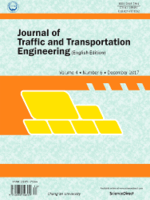
Journal of Traffic and Transportation Engineering-English Edition
Scope & Guideline
Innovative Insights for Safer and Smarter Transportation Solutions.
Introduction
Aims and Scopes
- Traffic Safety and Management:
Research focused on assessing and improving traffic safety measures, analyzing accident data, and developing strategies to mitigate risks in various traffic environments. - Transportation Systems Modeling:
Utilization of advanced modeling techniques, including simulation and machine learning, to predict traffic flow, optimize transportation systems, and evaluate the impact of autonomous vehicles. - Sustainable Transportation Solutions:
Exploration of sustainable practices and technologies in transportation, including the use of alternative fuels, electric vehicles, and eco-friendly pavement materials. - Infrastructure Engineering and Maintenance:
Studies related to the design, performance, and maintenance of transportation infrastructure, such as roads, bridges, and pavements, focusing on materials and structural integrity. - Public Transportation and Urban Mobility:
Research on enhancing public transport systems, understanding commuter behavior, and improving urban mobility through innovative solutions and policy analyses. - Data-Driven Approaches in Transportation:
Application of big data analytics, machine learning, and artificial intelligence to enhance decision-making processes in traffic management and infrastructure development.
Trending and Emerging
- Smart Transportation Systems:
Growing interest in intelligent transportation systems (ITS) that leverage technology for real-time traffic management, vehicle-to-infrastructure communication, and enhanced user experience. - Sustainable and Green Materials:
Increased research on sustainable construction materials, such as recycled and eco-friendly asphalt mixtures, to reduce the environmental impact of transportation infrastructure. - Impact of Autonomous Vehicles:
A significant rise in studies examining the effects of autonomous and connected vehicles on traffic patterns, safety, and infrastructure design. - Data-Driven Decision Making:
Emerging emphasis on using big data analytics and machine learning techniques for traffic prediction, optimization, and management, reflecting the shift towards data-driven approaches. - Pedestrian and Vulnerable Road User Safety:
Heightened focus on safety measures and infrastructure improvements for pedestrians, cyclists, and other vulnerable road users in urban environments. - Public Health and Transportation:
Increasing recognition of the intersection between transportation systems and public health, including studies on mobility, accessibility, and the health impacts of transportation choices.
Declining or Waning
- Traditional Traffic Control Measures:
Research on conventional traffic control techniques, such as fixed signal timings and manual traffic management, has decreased as more adaptive and intelligent systems gain prominence. - Non-Automated Vehicle Studies:
With the rise of autonomous vehicle technology, studies focusing solely on traditional vehicle dynamics and human-driven traffic interactions are becoming less frequent. - Static Infrastructure Assessments:
Research concentrating on static analysis of transportation infrastructure, without consideration for dynamic factors such as traffic flow variability and real-time data, is waning. - Manual Data Collection Methods:
The reliance on manual data collection techniques for traffic studies is declining in favor of automated and sensor-based data acquisition methods. - Localized Traffic Studies:
Research limited to specific geographic locations without broader implications or applicability is decreasing as global and comparative studies become more relevant.
Similar Journals
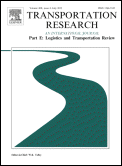
TRANSPORTATION RESEARCH PART E-LOGISTICS AND TRANSPORTATION REVIEW
Driving Efficiency in Transportation Systems and LogisticsTRANSPORTATION RESEARCH PART E-LOGISTICS AND TRANSPORTATION REVIEW, published by PERGAMON-ELSEVIER SCIENCE LTD in the United Kingdom, is a leading academic journal that focuses on the complementary fields of logistics and transportation. Since its inception in 1997, this journal has been instrumental in shaping the discourse around various facets of transportation systems, supply chain optimization, and logistical efficiency. With an impressive 2023 impact factor and a prestigious ranking, classified as Q1 in key categories such as Business and International Management, Civil and Structural Engineering, and Management Science and Operations Research, it stands at the forefront of research in its domain. The journal is committed to disseminating high-quality research and offers open access options to enhance the visibility and impact of its articles. As it converges its content through 2024, it continues to provide invaluable insights to a diverse audience of researchers, practitioners, and students who are keen on advancing knowledge and practices in transportation and logistics.

PROCEEDINGS OF THE INSTITUTION OF CIVIL ENGINEERS-TRANSPORT
Bridging Knowledge Gaps in Engineering and TransportPROCEEDINGS OF THE INSTITUTION OF CIVIL ENGINEERS-TRANSPORT, published by Emerald Group Publishing Ltd, is a vital scholarly journal dedicated to advancing knowledge in the fields of civil and structural engineering and transportation. With an ISSN of 0965-092X and an E-ISSN of 1751-7710, this journal has been a cornerstone of academic discourse since its inception in 1992, providing a platform for innovative research and case studies up until 2024. Although it currently holds a Q4 quartile ranking in both Civil and Structural Engineering and Transportation categories, its content aims to bridge gaps in existing literature, making it a relevant source for researchers, professionals, and students alike. The journal offers an array of insightful articles that contribute to the evolution of engineering practices and transportation methodologies, fostering a global dialogue among industry stakeholders. While it operates under a subscription model, the journal remains committed to enhancing public access to pivotal findings in engineering disciplines, driving forward the agenda of sustainable and efficient infrastructure development.
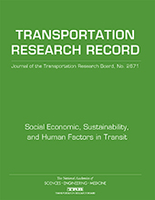
TRANSPORTATION RESEARCH RECORD
Navigating the Path of Transportation InnovationTRANSPORTATION RESEARCH RECORD is a premier journal published by SAGE PUBLICATIONS INC, focusing on the latest advancements and research in the fields of civil and structural engineering as well as mechanical engineering. Since its inception in 1974, this journal has become an essential platform for disseminating innovative methodologies, case studies, and comprehensive reviews that address critical issues in transportation systems and infrastructure. With a respectable Q2 ranking in both engineering categories as of 2023, it solidifies its position among reputable publications, catering to a diverse range of scholars, professionals, and students. The journal not only facilitates access to high-quality research but also plays a pivotal role in shaping policy and practice through its robust findings. For those invested in the engineering disciplines, particularly within the transportation domain, TRANSPORTATION RESEARCH RECORD is an invaluable resource, with a wide array of topics covered throughout converged years, from 1974 to 1990, and from 1993 to 2024, ensuring a comprehensive exploration of historical and contemporary challenges in transportation.

Baltic Journal of Road and Bridge Engineering
Advancing Infrastructure: Bridging Ideas and InnovationThe Baltic Journal of Road and Bridge Engineering, published by RIGA TECHNICAL UNIV-RTU, serves as a pivotal platform for disseminating cutting-edge research in the fields of building and construction as well as civil and structural engineering. Established as an Open Access journal since 2006, it fosters global collaboration and accessibility to critical engineering knowledge, facilitating the exchange of innovative ideas among researchers, professionals, and students. With a commendable impact factor and recognition in Scopus rankings, where it stands in the third quartile for both relevant engineering categories, the journal underscores its significance in advancing the discipline. The journal aims to publish high-quality, peer-reviewed articles that address contemporary challenges in road and bridge engineering, making it an essential resource for anyone involved in infrastructure development and research. Located in Lithuania at 6B Kipsalas Street, RIGA LV-1658, this journal not only highlights the latest advancements but also seeks to inspire future innovations in engineering practices.
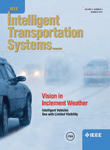
IEEE Intelligent Transportation Systems Magazine
Charting New Paths in Intelligent Transportation SystemsIEEE Intelligent Transportation Systems Magazine, published by the IEEE-Institute of Electrical and Electronics Engineers Inc., is a leading journal in the fields of automotive engineering, computer science applications, and mechanical engineering. With an impressive impact factor reflected in its 2023 rankings, this journal sits in the top quartile (Q1) across multiple engineering categories, making it an essential resource for researchers and professionals dedicated to advancing the intelligent transportation systems landscape. The magazine covers a diverse array of topics from vehicle technology innovations to traffic management solutions, aimed at improving transportation efficiency, safety, and sustainability. Since its inception in 2009, the publication has established a solid reputation for disseminating cutting-edge research and practical applications in intelligent transportation, all while remaining an accessible resource for academic and industrial stakeholders alike. Subscribe today to stay at the forefront of transformative transportation technologies!

TRANSPORTATION RESEARCH PART C-EMERGING TECHNOLOGIES
Pioneering Research for a Smarter Transport FutureTRANSPORTATION RESEARCH PART C - EMERGING TECHNOLOGIES is a leading journal dedicated to the exploration and dissemination of innovative solutions in the field of transportation. Published by PERGAMON-ELSEVIER SCIENCE LTD in the United Kingdom, this journal has been pivotal in advancing the understanding of emerging transportation technologies since its inception in 1993. With a robust impact across multiple disciplines, it proudly holds a Q1 status in key categories such as Automotive Engineering, Civil and Structural Engineering, and Computer Science Applications, underscoring its vital role in shaping research and development in these areas. Researchers and practitioners are encouraged to engage with its rich repository of knowledge, which includes rigorous peer-reviewed articles aimed at addressing contemporary challenges in the transportation sector. While it currently does not operate under an Open Access model, the journal remains an essential resource for professionals and scholars committed to the field. With an affiliation to the prestigious Scopus database, TRANSPORTATION RESEARCH PART C stands as a beacon of scholarly excellence, driving the future of transportation technologies.

IEEE Open Journal of Intelligent Transportation Systems
Advancing Research for Safer Roads.IEEE Open Journal of Intelligent Transportation Systems, published by the IEEE-INST ELECTRICAL ELECTRONICS ENGINEERS INC, stands at the forefront of innovation in the realm of intelligent transportation systems since its inception in 2020. With its open-access format, this journal aims to disseminate groundbreaking research and technology advancements to a broader audience, fostering collaboration and knowledge exchange among professionals in the automotive, mechanical, and computer science engineering sectors. It boasts impressive Q1 rankings in Automotive Engineering, Computer Science Applications, and Mechanical Engineering as of 2023, highlighting its critical role in shaping the future of transportation technologies. The journal's exceptional standing is further evidenced by its Scopus rankings; it holds the 76th percentile in Mechanical Engineering and the 74th percentile in Automotive Engineering, making it a premier outlet for cutting-edge research. Researchers, professionals, and students seeking to navigate the evolving challenges and solutions in intelligent transportation systems will find this journal an invaluable resource.
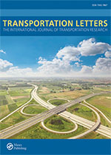
Transportation Letters-The International Journal of Transportation Research
Exploring the frontiers of transportation systems and policies.Transportation Letters - The International Journal of Transportation Research, published by Taylor & Francis Ltd, is a leading journal dedicated to advancing the field of transportation studies. With an impact factor that reflects its significance within the academic community and a prestigious ranking of Q2 in Transportation, this journal provides a critical forum for the dissemination of innovative research and insights in transportation systems, policies, and technologies. Covering a broad scope of topics from urban mobility to logistics and infrastructure, Transportation Letters serves as an essential resource for researchers, professionals, and students aiming to deepen their understanding of transportation issues facing society today. With over a decade of publication since 2009, the journal has established a solid reputation, ranking 46th out of 141 in Scopus's transportation category, placing it in the 67th percentile. Although it does not operate under an open-access model, it remains committed to accessibility through various subscription options, ensuring that vital research is available to those shaping the future of transportation.

Jordan Journal of Civil Engineering
Elevating Standards in Civil Engineering ResearchThe Jordan Journal of Civil Engineering, ISSN 1993-0461 and E-ISSN 2225-157X, serves as a pivotal platform for research dissemination in the field of civil engineering. Published by Jordan University of Science & Technology, this journal has established itself as a vital resource since its inception in 2007 and continues to impact the academic community with its wide-ranging scope covering innovative practices and cutting-edge research in civil and structural engineering. Holding a respectable Q3 ranking in the 2023 category, with Scopus positioning it at rank #235 out of 379, the journal reflects growing recognition within its discipline. Although currently not an open-access publication, it provides essential insights that can benefit researchers, industry professionals, and students seeking to contribute to advancements in civil engineering through rigorous scholarly articles and studies up to 2024. Its commitment to high academic standards enhances the relevance and importance of its contributions to both local and global engineering practices.
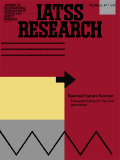
IATSS Research
Connecting ideas and practices for a sustainable future.IATSS Research, published by Elsevier Science Ltd, stands as a premier open-access journal at the intersection of engineering, safety research, urban studies, and transportation. Established in 2000, this esteemed journal caters to a diverse audience of researchers, industry professionals, and students eager to delve into innovative research that addresses pressing societal challenges. With an impressive impact factor and a consistent demonstration of high-quality scholarship, IATSS Research has achieved notable rankings within Scopus, including a top-tier position in Safety Research (Rank #13/109, 88th percentile) and Engineering (Rank #46/307, 85th percentile). The journal has evolved significantly since its inception, reflecting the dynamic nature of its converged fields from 2008 to 2024. By embracing open access, IATSS Research amplifies the reach of critical findings and fosters collaboration across disciplines, making it an invaluable resource for anyone invested in advancing knowledge and practices in modern engineering and urban safety.